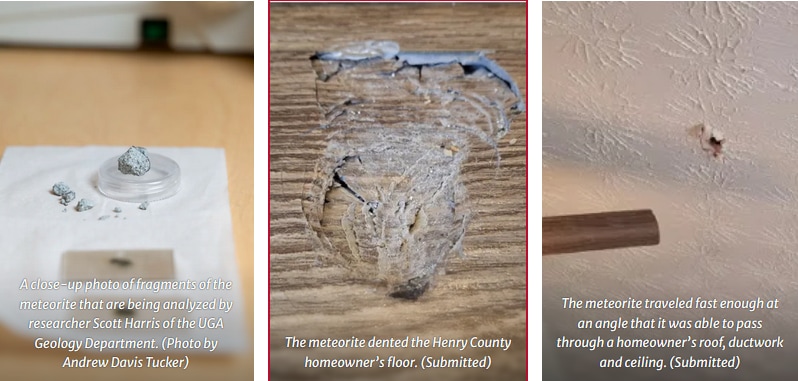A meteorite that crashed into a home in Atlanta, Georgia, is older than our planet Earth, according to a scientist who examined a fragment of the space rock.
University of Georgia planetary geologist Scott Harris, who thoroughly examined a meteorite fragment, stated that the space rock is estimated to be 4.56 billion years old, making it 20 million years older than Earth.
“This particular meteor that entered the atmosphere has a long history before it made it to the ground of McDonough, and in order to totally understand that, we actually have to examine what the rock is and determine what group of asteroids it belongs to,” said Scott Harris, a researcher in the UGA Franklin College of Arts and Sciences’ department of geology.
Harris examined 23 of the 50 grams of meteorite fragments recovered from a piece the size of a cherry tomato that struck a man’s roof like a bullet and left a dent in the floor of the home outside Atlanta.
“It belongs to a group of asteroids in the main asteroid belt between Mars and Jupiter that we now think we can tie to a breakup of a much larger asteroid about 470 million years ago,” Harris says. “But in that breakup, some pieces get into Earth-crossing orbits, and if given long enough, their orbit around the sun and Earth’s orbit around the sun end up being at the same place, at the same moment in time.”
The geologist used optical and electron microscopy to determine that the rock was a chondrite, a type of meteorite that originated in the early solar system and is rich in carbon, water, and clay materials. In fact, according to NASA, chondrites are the most abundant type of stony meteorite.
Harris said that scientists at the University of Georgia, along with colleagues from Arizona State University, plan to submit their findings to the Nomenclature Committee of the Meteoritical Society. They have proposed naming the space rock the McDonough Meteorite, reflecting the name of the Georgia city where it struck the Earth.
Story continues below this ad
The University of Georgia said the meteorite studied by Hariss and the team , was the the 27th meteorite recovered in the history of the state, and was among the sixth witnessed fall.
 Harris examined 23 of the 50 grams of meteorite fragments recovered from a piece the size of a cherry tomato. (Image credit: uga.edu)
Harris examined 23 of the 50 grams of meteorite fragments recovered from a piece the size of a cherry tomato. (Image credit: uga.edu)
“This is something that used to be expected once every few decades and not multiple times within 20 years,” Harris said. “Modern technology in addition to an attentive public is going to help us recover more and more meteorites.”
Over the years, scientists have sought to understand the role of meteorites in the formation of the solar system. Earth formed roughly 4.5 billion years ago. In its infancy, it was bombarded by meteorites, comets, and other material from space.
In June, the American Meteor Society received reports of a fireball that streaked across the southeastern U.S. sky in broad daylight. NASA confirmed that the meteor entered Earth’s atmosphere during the Bootids meteor shower, a relatively minor celestial event occurring in the last week of June.
Around the same time, a resident of Henry County, Georgia, reported that a rock, now identified as the McDonough Meteorite, crashed through their ceiling, according to the National Weather Service in Peachtree City. The object broke through the roof and ceiling before cracking the flooring inside the home.
Story continues below this ad
“I suspect that he heard three simultaneous things. One was the collision with his roof, one was a tiny cone of a sonic boom and a third was it impacting the floor all in the same moment,” Harris said. “There was enough energy when it hit the floor that it pulverized part of the material down to literal dust fragments.”















_limo_Green_Red_color.png?w=700&c=0)









































